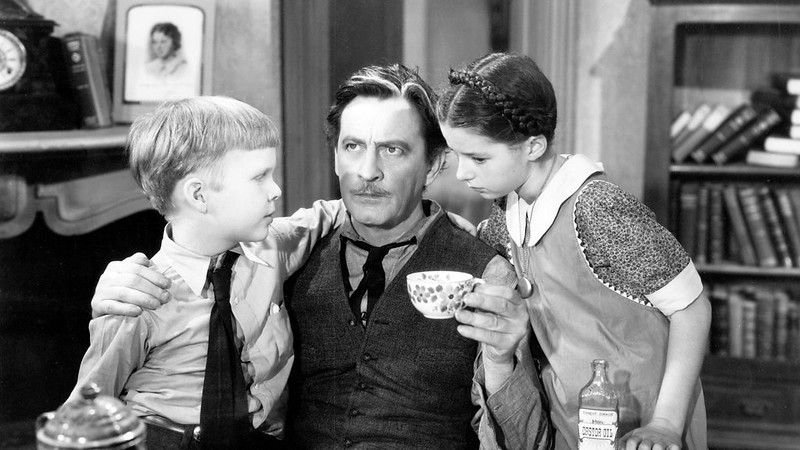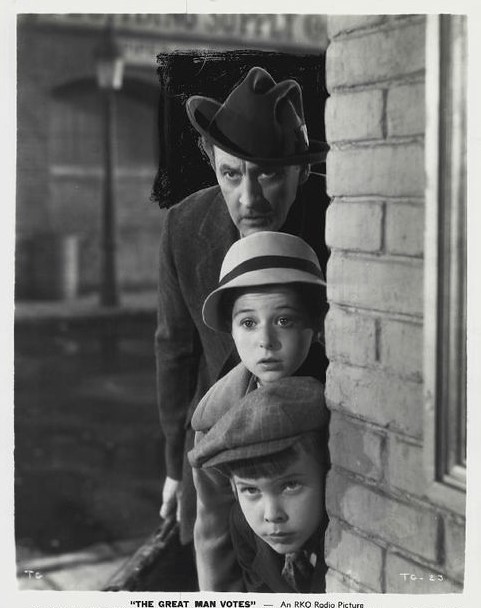“But even a Barrymore on the decline is still more than a match for any other actor in Hollywood: most of his role calls for flamboyant theatrics a la “20th Century,” and he launches into his tirades with magnificent gusto. But in the scenes of tenderness and pathos, and in the climactic speech, that love of his profession makes itself manifest– it’s a tired and ageing Barrymore reciting the lines, a Barrymore in whom the spark has begun to die, but still a Barrymore too devoted to the theatre to give anything but his best– even though that best might be of a lesser standard than in previous years.” ~William K. Everson, Notes on The Great Man Votes
During every election season, we hear a lot about the importance of the individual vote. The Great Man Votes (1939) celebrates that noble institution while adding a trace of satire to the proceedings. The film is reminiscent of the work of Preston Sturges, who often poked fun of American institutions while still embracing them. The Great Man Votes, directed by Garson Kanin and based on a short story by Gordon Malherbe Hillman, is more than a half-forgotten comedy about precinct politics. It’s an often times poignant slice of Americana enhanced by a wonderful performance by John Barrymore. For Barrymore, the year 1939 was the beginning of the end of his career. His screen performances would take a precipitous downturn into self-parody, but here we see why he remains one of the true screen immortals.
Set in 1923, the film tells the story of Gregory Vance (John Barrymore), a widower with two children. He works as a night watchman but has a weakness for booze; he knows precisely when his shift is over by consulting his “hourglass”—a near-empty bottle of whisky. Despite this rather ignominious position in life, his background is that of a Harvard scholar. With his knowledge of languages (and the Barrymore theatrics), he instills his own brand of education into his kids, Donald (Peter Holden) & Joan (Virginia Weidler). Both of whom believe in his potential even if he only sees himself as a “meringue pie.”
Joan is a practical girl– a point her father likes to emphasize. Both she and her brother are expected to carry on the family ideals, if not the dreams. Those ideals hit a bump in the road after Donald pushes the spoiled son of a local politico into a box of cement. Seeing themselves as outlaws, they escape to the country. “What did Christopher Columbus ever amount to until he got out of town?” On the road, they arrive at the Ainslee family farm where they stay with relatives. This sets up a subplot involving the aunt and uncle trying to reclaim the kids and raise them properly in a well-to-do home.
When it’s determined by the politicians (including the ineffective mayor) that the 13th precinct must be won in the mayoral election, Vance gets his opportunity to shine. It seems that he is the only registered voter in the 13th precinct; if the 13th is unanimous then all the other precincts of the ward will follow. Vance is expected to be the stalwart voter to hold up tradition and is courted by his old rival, “Iron Hat” McCarthy (Donald McBride). He is the boss of the ward who tries to get Vance to pledge his vote. (McCarthy is the sort who passes out candy to all the children because, as he sees it, they will be “voting a straight ticket one day.”) Taking full advantage of the situation with McCarthy and the mayor (while still retaining his honor), Vance bargains his way into a new position as school commissioner in order to keep his children at his side.
Amidst this milieu of city politics, it’s the relationship between the father and his children that makes the film so delightful. In years past, John Barrymore often played adventurers, princes and bankrupt barons, so it is refreshing to see him portraying such a down-to-earth role, relatively speaking, of a man raising his two kids. Barrymore was certainly on the decline by this time, and this may very well be his last genuinely great performance. With the exception of Midnight (1939), the films that followed simply poked fun of his public image, most notably The Great Profile and Playmates. Years of drinking had by this time affected his memory to such a degree that he was reduced to reading most of his lines off a blackboard. But even with this handicap, few actors could rival Barrymore. He is often at the top of his game in this film. What is so touching here is that there is certainly some of John Barrymore in the character of Gregory Vance. As Joan says, “What Pop could be and what he is are two different things.”
Peter Holden plays Donald Vance. This film appears to be his only screen credit, although he did play the role of “Pud” in the 1938 Broadway version of On Borrowed Time. (Unfortunately, he did not reprise the role in the MGM film version in 1939, which starred Lionel Barrymore and Bobs Watson as Pud.) Virginia Weidler, as Joan, was never in the same league as Shirley Temple in terms of popularity, but to this viewer at least, her performances are of more interest than those of the cutesy “Curly Top.” Whereas so many child actors of the time could be grating or saccharine, neither is the case with Joan Weidler. In fact, both of the young characterizations are presented intelligently and with respect, and each part has a dimension that rings true. Also in the cast are character actors Donald McBride and William Demarest (as a campaign promoter)– the latter a regular in many Preston Sturges comedies. Finally, Katharine Alexander portrays Miss Billow, the schoolteacher with a noted interest in the “great man.”
Though The Great Man Votes is essentially a B film made at RKO, it’s unlike anything else. It is such an offbeat film. For one thing, the school classroom actually depicts other races without stereotypes. It’s a minor point, but noteworthy. The film strikes at fundamental truths and shows challenges that kids face in the real world– school bullies, snobbery, growing up lacking what other kids have, and the general idiosyncrasies of family life. One of the more humorous episodes has Joan forcing her father to take castor oil in place of his usual “quart a day” medicine.
The Great Man Votes features a wonderful script and the thoughtful direction of Garson Kanin. Kanin had started his career as a director the year before. He would go on to write the screenplay for A Double Life (1947), which won its star, Ronald Colman, an Academy Award for Best Actor. At 72 minutes, the film is well-paced and imaginatively edited. One of the more interesting sequences is a dialogue scene in which we only see the Vance children walking to school– Donald kicking a can and Joan stepping along the lines of the sidewalk.
But of the film’s greatest quality, it is the performance of John Barrymore. His finest scene comes near the end after he has cast his vote and the cheering crowd asks him to make a speech. In an incredibly touching moment, Vance tries to express what it means to have left his mark in a ballot box. “But I will be no less a part of that total greatness because being even the least in a land where strength is so generous is greatness in itself.”
NOTE: The Great Man Votes is available on DVD through the Warner Archive Collection.
~MCH
The 1940 radio version of The Great Man Votes with John Barrymore…

